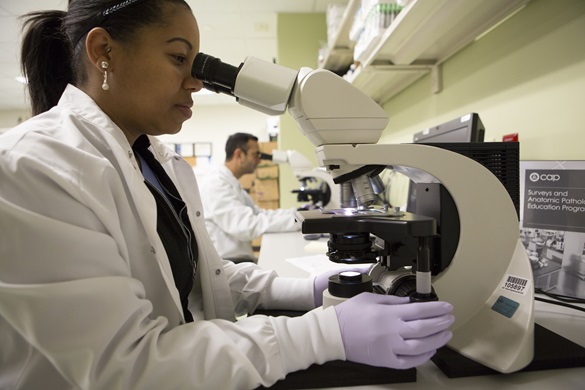
News & Updates
Why New Cancer Treatment Discoveries are Proliferating
Wednesday, July 19, 2023
The approval of CAR T cell therapy ushered in a new era for cancer treatment.
In the five years since the FDA’s initial approval of chimeric antigen receptor (CAR) T cell therapy, Penn Medicine has gleaned 20 additional approvals related to drugs and techniques to treat or detect cancer. Dr Carl June, who’s research that led to the discovery of CAR T cell therapy was funded by Leonard and Madlyn Abramson. Rather than being the single disease class many people refer to, “cancer” is a blanket term that covers more than 100 distinct diseases, many of which have little in common aside from originating with rapidly dividing cells. Since different cancers demand different treatments, it follows that any given new therapy emerging from any institution would be likely to be a new cancer treatment.
The volume of new cancer treatments makes sense, says Abramson Cancer Center (ACC) Director Robert Vonderheide, MD, DPhil, attributing the flurry of new cancer drug approvals to a recent “explosion” in knowledge about cancer biology.
“Much of that knowledge is about the immune system’s ability to attack cancer, which people seriously doubted until about 20 years ago. As soon as we had a clinical validation for this Achilles heel in cancer, the dam burst for ideas about other ways to exploit that vulnerability to come forward,” he says. “The first drug that came out to activate the immune system inspired the rest of the field to find the next drug, and the one after that. We as a field have moved from serendipity and empiricism to science-driven drug design.”
The first CAR T cell therapy approval invigorated Penn faculty interested in finding new ways to harness the immune system to fight cancer.
To read more about the advancements since CAR T Cell Therapy, see here from Penn Medicine: https://www.pennmedicine.org/news/publications-and-special-projects/penn-medicine-magazine/spring-2023/why-new-cancer-treatment-discoveries-are-proliferating


The approval of CAR T cell therapy ushered in a new era for cancer treatment.
In the five years since the FDA’s initial approval of chimeric antigen receptor (CAR) T cell therapy, Penn Medicine has gleaned 20 additional approvals related to drugs and techniques to treat or detect cancer. Dr Carl June, who’s research that led to the discovery of CAR T cell therapy was funded by Leonard and Madlyn Abramson. Rather than being the single disease class many people refer to, “cancer” is a blanket term that covers more than 100 distinct diseases, many of which have little in common aside from originating with rapidly dividing cells. Since different cancers demand different treatments, it follows that any given new therapy emerging from any institution would be likely to be a new cancer treatment.
The volume of new cancer treatments makes sense, says Abramson Cancer Center (ACC) Director Robert Vonderheide, MD, DPhil, attributing the flurry of new cancer drug approvals to a recent “explosion” in knowledge about cancer biology.
“Much of that knowledge is about the immune system’s ability to attack cancer, which people seriously doubted until about 20 years ago. As soon as we had a clinical validation for this Achilles heel in cancer, the dam burst for ideas about other ways to exploit that vulnerability to come forward,” he says. “The first drug that came out to activate the immune system inspired the rest of the field to find the next drug, and the one after that. We as a field have moved from serendipity and empiricism to science-driven drug design.”
The first CAR T cell therapy approval invigorated Penn faculty interested in finding new ways to harness the immune system to fight cancer.
To read more about the advancements since CAR T Cell Therapy, see here from Penn Medicine: https://www.pennmedicine.org/news/publications-and-special-projects/penn-medicine-magazine/spring-2023/why-new-cancer-treatment-discoveries-are-proliferating

